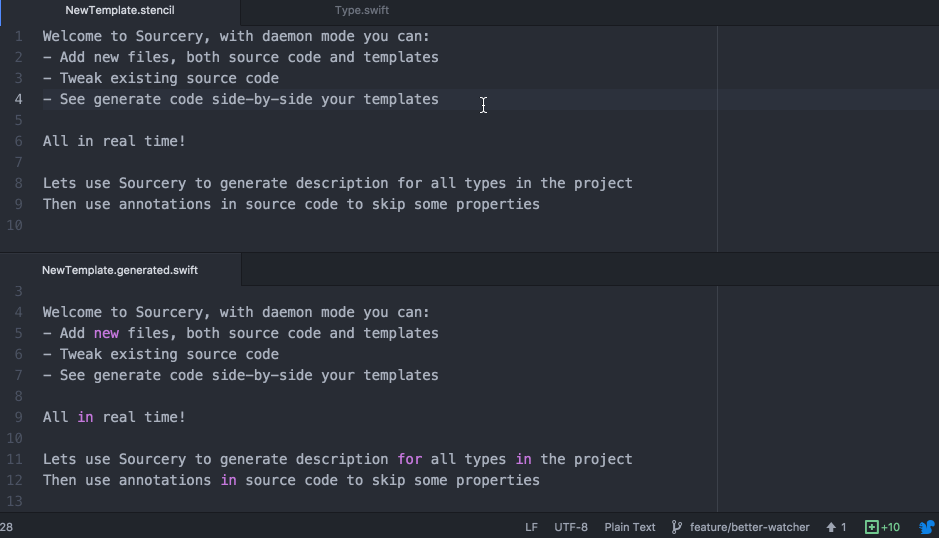Insanity 0.2.0
- 由
- Krzysztof Zabłocki
- merowing_
什么是 Insanity?
反复做同样的事情,却期待不同的结果。
Swift 是一种美丽的语言,为许多优秀的 iOS 应用提供了动力。不幸的是,它具有非常有限的运行时和没有元编程功能。这导致我们的项目中充满了大量的重复代码模式,可以认为是相同的代码,只是进行了最小的修改。
你有没有?
- 必须编写 NSCoding 支持?
- 必须实现 JSON 序列化?
- 希望值类型可相等且可哈希?
- 使用枚举来封装解耦的类型?
如果您这样做,您可能发现自己在编写大量重复的代码来处理这些场景,这感觉对吗?
更糟糕的是,如果您为类型添加了新的属性,所有这些实现都必须更新,否则您将陷入 bug 的境地。在这些场景中,通常 编译器不会生成错误信息供您处理,这使得代码易于出错。
Insanity 是一种工具,它可以扫描您的源代码,应用您个人的模板,并为您生成 Swift 代码,让您可以使用元编程技术来节省时间并减少潜在错误。
- 扫描项目代码。
- 允许您的模板访问有关项目类型的信息。
- 生成 Swift 代码。
- 即时反馈: Insanity 具有内置守护进程支持,允许您在实时与生成的代码并排写入模板。
使用 Insanity 方法有多种好处
- 减少模板代码的编写并使其轻松遵循 DRY 原则
- 避免重构时忘记更新模板的风险
- 提供元编程功能,同时仍然允许编译器确保一切正确。
守护模式运行效果
所有事物是如何连接的
+--------------+
Scans code to build AST | | Generates new code
+----------------------------> INSANITY +--------------------------------+
| | | |
| +--^--------^--+ |
| | | |
| | | Reads templates |
| | | |
+-----+------+ +----------------+--+ +--+----------------+ +---------v---------+
| | | | | | | |
| Source | | Equality Template | | NSCoding Template | | Generated Swift |
| | | | | | | |
+-----^------+ +-------------------+ +-------------------+ +-------------------+
| |
| |
| |
+----------------------------------------------------------------------------+
Compiled into your project
示例
用例: 我想知道每个枚举中有多少元素
模板
{% for enum in types.enums %}
extension {{ enum.name }} {
static var count: Int { return {{ enum.cases.count }} }
}
{% endfor %}结果
extension AdType {
static var count: Int { return 2 }
}用例:`我想为实现特定协议的类型生成相等性'。
模板
{% for type in types.implementing.AutoEquatable %}
extension {{ type.name }}: Equatable {}
func == (lhs: {{ type.name }}, rhs: {{ type.name }}) -> Bool {
{% for variable in type.storedVariables %} if lhs.{{ variable.name }} != rhs.{{ variable.name }} { return false }
{% endfor %}
return true
}
{% endfor %}结果
extension AccountSectionConfiguration: Equatable {}
func == (lhs: AccountSectionConfiguration, rhs: AccountSectionConfiguration) -> Bool {
if lhs.status != rhs.status { return false }
if lhs.user != rhs.user { return false }
if lhs.entitlements != rhs.entitlements { return false }
return true
}用例:`我想列出给定类型中的所有计算变量。
模板
{% for variable in type.VideoViewModel.computedVariables %} {{ variable.name }}: {{ variable.type }}
{% endfor %}结果
attributedTitle: NSAttributedString
attributedKicker: NSAttributedString
attributedHeadline: NSAttributedString
attributedSummary: NSAttributedString编写模板
Insanity 模板由 Stencil 提供
确保您利用 Insanity 内置守护进程来使编写模板变得更加愉快:您可以打开模板并与生成的代码并排显示,并实时查看其变化。
有多个方法来访问您的类型
-
type.TypeName=>通过名称访问特定类型 -
types.all=>所有类型(排除协议) types.classestypes.structstypes.enums-
types.protocols=>列出所有协议(在项目中定义的协议) -
types.inheriting.BaseClassOrProtocol=>列出所有从给定基类继承或实现给定协议的类型 -
types.implementing.BaseClassOrProtocol=>与.inheriting功能完全相同的便捷别称
对于每种类型,您可以访问以下属性
name-
localName<-父作用域中的名称 -
staticVariables<-静态变量列表 -
variables<-实例变量列表 -
computedVariables<-计算实例变量列表 -
storedVariables<-计算存储变量列表 -
inheritedTypes<-实施/继承此类型的类型名称列表 -
containedTypes<-在此类型中包含的类型列表 -
parentName<-包含类型的父类型列表
Enum 类型建立在常规类型之上,并添加
-
rawType<-枚举原始类型 -
cases<-Enum.Case列表
Enum.Case 提供
-
name<-名称 -
rawValue<-原始值 -
associatedValues<-AssociatedValue列表
Enum.Case.AssociatedValue 提供
-
name<-名称 -
type<-相关值的类型
安装
安装
通过 CocoaPods
如果您正在使用 CocoaPods,只需将 pod 'Insanity' 添加到您的 Podfile。这将下载 Insanity 可执行文件和依赖项到 Pods/。您只需要将 $PODS_ROOT/Insanity/bin/Insanity 添加到您的 Script Build Phases。
手动
您可以从代码库中克隆它并仅运行Insanity.xcworkspace。用法
Insanity 是一个命令行工具 Insanity
$ ./Insanity <source> <templates> <output>
参数
- source - 源 Swift 文件的路径。
- templates - 模板的路径。文件或目录。
- output - 输出路径。文件或目录。
选项
-
--watch[默认:false] - 监视模板的变化,并根据需要重新生成。仅适用于特定模板路径(不是目录)。 -
--verbose[默认:false] - 启用忽略实体的详细日志记录
贡献
欢迎并向 Insanity 贡献!
请参阅 贡献指南。
为了使社区期望清晰,Insanity 采用了贡献者誓言中定义的行为准则。这份文件在许多开源社区中使用,我认为它很好地阐述了我们的价值观。更多信息,请参阅 行为准则。
许可
Insanity遵循MIT许可协议。更多信息请见LICENSE。
致谢
本工具由以下组件支持
- SourceKitten by JP Simard
- Stencil以及其他库由Kyle Fuller提供
Olivier Halligon指给我一些他的CLI工具设置脚本,非常实用,谢谢!
其他库/工具
如果您想生成与资产相关的逻辑代码,我强烈推荐SwiftGen
请确保检查我的其他库和工具,尤其是
- KZPlayground - 呈现强大功能Swift和Objective-C的playground
- KZFileWatchers - 监控本地和远程文件变化的守护进程,用于构建其他开发者工具(Insanity使用它)
您可以在Twitter上关注我的项目更新。
